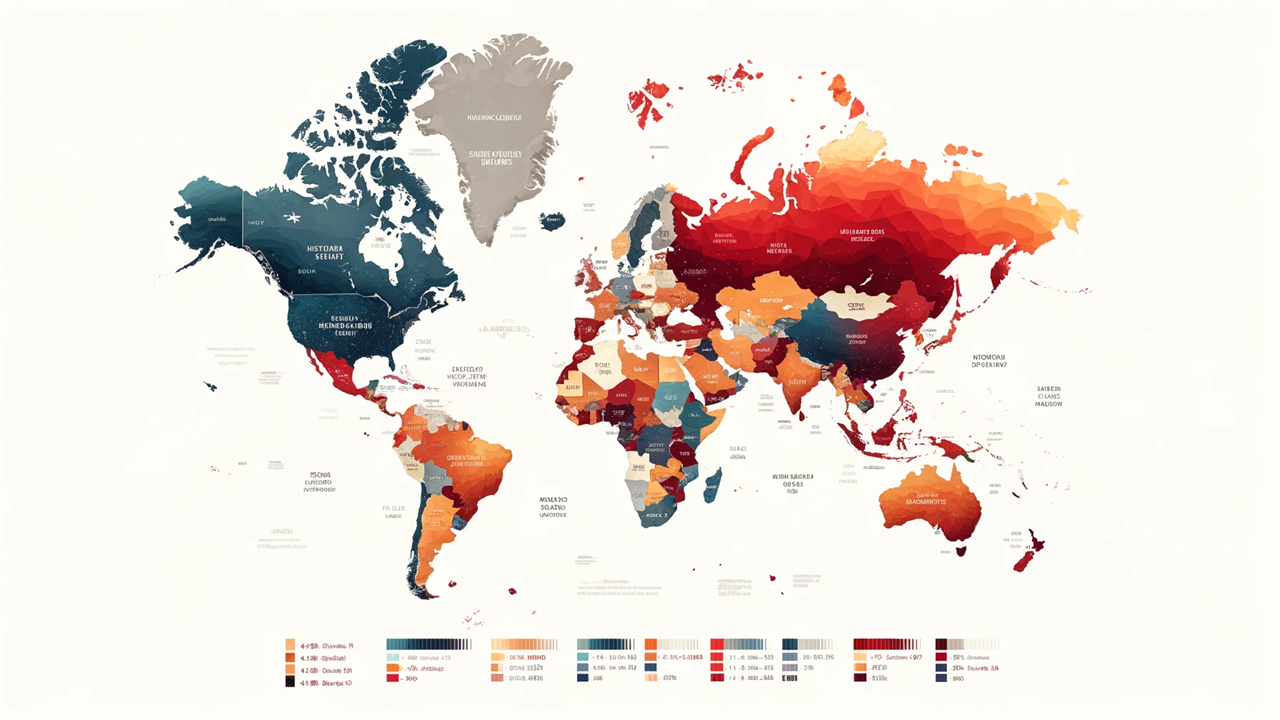Tackling Inequality: The World Bank's New Indicator Sparks Hope for a Fairer Future
The World Bank has introduced a new indicator to measure global inequality by tracking countries with a Gini index above 40. This shift aims to highlight the importance of reducing inequality for sustainable development. The new measure underscores the significance of equitable opportunities, combating elite capture, reducing poverty, fostering economic growth, mitigating climate change, and enhancing social cohesion. With 52 countries currently classified as high inequality, this new approach marks a significant step in the fight against global inequality.

In a bold move to address global inequality, the World Bank has introduced a groundbreaking new indicator: the number of countries with a high Gini index. This new measure, focusing on countries with a Gini index above 40, aims to highlight and tackle the persistent issue of inequality worldwide. Let's delve into why this change is significant and what it entails.
A New Vision for Equality
For the first time, the World Bank is using within-country inequality as a key indicator to track progress toward its ambitious goal of ending poverty on a livable planet. This new approach replaces the previous core measure of shared prosperity, which focuses on the growth of the bottom 40% in each country. By shifting the focus to the number of countries with a Gini index above 40, the World Bank is emphasizing the importance of reducing inequality to foster sustainable development.
The Importance of Reducing Inequality
Opportunities and Justice: High levels of inequality often reflect unjust societies where opportunities are largely determined by inherited characteristics such as ethnicity, gender, and socioeconomic status. This results in wasted human potential, as those without inherited advantages struggle to access education and employment. By addressing inequality, societies can ensure that opportunities are more equitably distributed, allowing for a more just and prosperous future.
Elite Capture and Corruption: Economic inequality frequently translates into political and social inequality, with powerful groups capturing resources meant for the broader population. This elite capture can hinder policies aimed at leveling the playing field and ensuring broad-based economic growth, exacerbating poverty and inequality.
Poverty Reduction: Lowering inequality is a potent strategy for reducing poverty. When inequality decreases, the income or consumption of the worst-off increases, lowering their poverty severity and potentially lifting them out of poverty altogether. Research suggests that reducing inequality could have a more significant impact on global poverty than economic growth alone.
Economic Growth: While the relationship between inequality and economic growth is complex, reducing inequality, particularly inequality of opportunity, can spur economic growth. Reducing inequality can lead to a more efficient allocation of resources and increased economic mobility, benefiting society as a whole.
Climate Change: Inequality exacerbates the impact of climate change on the poorest populations, who are more exposed to extreme climatic events and less able to adapt due to limited resources. By reducing inequality, vulnerable populations can better adapt to climate change, mitigating its welfare implications. Moreover, reducing inequality can lower the need for economic growth, which drives greenhouse gas emissions, thereby helping to mitigate climate change.
Social Cohesion: Higher inequality is linked to greater political instability and lower resilience to economic shocks. By fostering greater economic fairness and reducing inequality, societies can enhance social cohesion and stability.
The Gini Index: A Measure of Inequality
The Gini index, chosen for its familiarity and basic theoretical properties, is used to measure inequality in this new indicator. Despite its complexity, the Gini index is a widely recognized measure, making it a suitable choice for tracking global inequality. Other measures such as the mean log deviation, the Theil index, Kuznets ratios, and quantile ratios were considered, but the Gini index was deemed the most appropriate for this purpose.
Data and Country Classification
The analysis relies on data from the World Bank’s Poverty and Inequality Platform (PIP), which includes Gini estimates for 169 countries. This data reveals that income inequality is generally higher than consumption inequality, with household surveys often underrepresenting the top income levels. Using a threshold of a Gini index above 40, 52 out of 169 countries are classified as high inequality. These high-inequality countries are predominantly found in Latin America & Caribbean, Southern Africa, low- and middle-income countries, IDA countries, and FCV countries. Notably, the number of high-inequality countries has decreased from 77 in 2000 to 52 in 2022.
Path Forward
The World Bank’s new inequality indicator marks a significant step forward in the fight against global inequality. By focusing on reducing within-country inequality, the World Bank aims to foster sustainable development and improve the well-being of the world’s poorest populations. Moving forward, the need for more frequent and comparable data is crucial to ensure accurate tracking of inequality. Additionally, addressing the challenges of underreporting top incomes will be vital in refining these measurements and setting appropriate thresholds for high inequality.
Reducing inequality is essential for creating a fairer and more sustainable world. The World Bank's new indicator not only highlights the importance of this issue but also provides a clear metric for tracking progress. As we move forward, continued efforts to gather accurate data and address underlying measurement challenges will be key to achieving a more equitable global society.
- FIRST PUBLISHED IN:
- Devdiscourse
ALSO READ
IAEA Head Holds Meeting in Peru to Boost Sustainable Development and Environmental Protection
JGU's Sustainable Development Report 2024 Released in Tokyo at the India-Japan Higher Education Forum
Tackling Poverty Amidst Global Megatrends: A Complex Challenge
Investment in a Digital Age: Unlocking Opportunities for Sustainable Development
UNDP Accelerator Labs Network Hosts Event on Social Innovation for Sustainable Development










